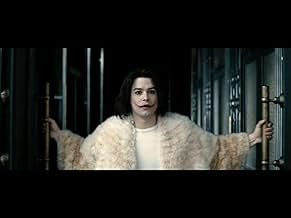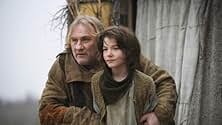L'homme qui rit
- 2012
- 1h 35m
IMDb RATING
6.0/10
1.5K
YOUR RATING
A freak show performer's life is turned upside down when he is discovered to be the missing son of a disgraced noble.A freak show performer's life is turned upside down when he is discovered to be the missing son of a disgraced noble.A freak show performer's life is turned upside down when he is discovered to be the missing son of a disgraced noble.
- Director
- Writers
- Stars
Monika Foris Kvasnicková
- Mary O'Reilly
- (as Monica Foris)
- Director
- Writers
- All cast & crew
- Production, box office & more at IMDbPro
Featured reviews
The literary Romantic masterworks by French author Victor Hugo have been banalized and passed to new generations through unfortunate musicals and animated movies, which have little or nothing to do with the atmosphere, passion and ideology of his time, a few years after the events that shocked France with its revolution. «Les miserables» and «Notre Dame de Paris» have been subject to many aberrations, including his novel «The Man Who Laughs», with adaptations that put Gwynplaine, its protagonist, to jump and sing like a puppet. As a matter of fact, he has been turned into a puppet, since he inspired American cartoonists who turned him into the Joker, which is still in the commercial exploitation circuit with all kinds of variations.
The original novel has had better luck in cinema, through the silent film of the same name of 1928, starring Conrad Veidt (of «The Cabinet of Dr. Caligari» fame). Now that I have seen the 2002 adaptation, I feel that Veidt's version, despite his good work, lacks the passion of this one, benefited by sound. For those who do not know the work, it is the story of the son of an English courtier who, when confronting King James, is murdered and his son sold to the band of the Comprachicos, who baptize him Gwynplaine and mutilate his face with a permanent smile. The boy is rescued by the circus Ursus, who raises him along with the blind girl Déa. Many years later, Gwynplaine has the option of claiming his title and place in court, but he fiercely attacks the British nobility.
Mounted with elegant production design (sets, costumes) and good images, thanks to current cinema technology, «The Man Who Laughs» is an enveloping and effective audiovisual experience, although there is a villain in the whole package: composer Stéphane Moucha, who overloads the story with a jingling score that reminds too much of Danny Elfman's music, without the humor of the American composer. Moucha has moved to television, where his type of score seems more relevant.
«L'homme qui rit» is a good reading of Victor Hugo's novel, rich in dark poetic tones, echoing the meaning of the Romantic movement of the 18th century, and it is worthy of revaluation. The good performances of the entire cast, led by the Canadian Marc-André Grondin in the title role, honor this story that exalts the humanity of the common man versus the excesses of the economic power of the nobility, perpetuated by the triumphant bourgeoisie of the 1789 revolution.
The original novel has had better luck in cinema, through the silent film of the same name of 1928, starring Conrad Veidt (of «The Cabinet of Dr. Caligari» fame). Now that I have seen the 2002 adaptation, I feel that Veidt's version, despite his good work, lacks the passion of this one, benefited by sound. For those who do not know the work, it is the story of the son of an English courtier who, when confronting King James, is murdered and his son sold to the band of the Comprachicos, who baptize him Gwynplaine and mutilate his face with a permanent smile. The boy is rescued by the circus Ursus, who raises him along with the blind girl Déa. Many years later, Gwynplaine has the option of claiming his title and place in court, but he fiercely attacks the British nobility.
Mounted with elegant production design (sets, costumes) and good images, thanks to current cinema technology, «The Man Who Laughs» is an enveloping and effective audiovisual experience, although there is a villain in the whole package: composer Stéphane Moucha, who overloads the story with a jingling score that reminds too much of Danny Elfman's music, without the humor of the American composer. Moucha has moved to television, where his type of score seems more relevant.
«L'homme qui rit» is a good reading of Victor Hugo's novel, rich in dark poetic tones, echoing the meaning of the Romantic movement of the 18th century, and it is worthy of revaluation. The good performances of the entire cast, led by the Canadian Marc-André Grondin in the title role, honor this story that exalts the humanity of the common man versus the excesses of the economic power of the nobility, perpetuated by the triumphant bourgeoisie of the 1789 revolution.
Barrandov Studios studio filmed version from newly prominent Améris, (Les émotifs anonymes ) ignores the Paggliacci element of the Victor Hugo story. We edge instead into Tim Burton territory. The red of the lamp reflected on the sail as the one warm patch in the grey frame, the sinister black and gold family mansion and the red and white of the Court are extraordinary feats of design.
Depardieu gets one of his bets outings in the traveling showman role, taking the disfigured boy and blind girl to the carnival, soon contrasting the sympathetic fairground and the stone hearted nobles.
Only a marginal connection to any reality but the film's mesmerising look dominates performances and story and makes this one of the more notable films of the moment.
I miss Conrad Veidt, Cesare Gravina and Josephine Cowl but his lot have created their own space.
Depardieu gets one of his bets outings in the traveling showman role, taking the disfigured boy and blind girl to the carnival, soon contrasting the sympathetic fairground and the stone hearted nobles.
Only a marginal connection to any reality but the film's mesmerising look dominates performances and story and makes this one of the more notable films of the moment.
I miss Conrad Veidt, Cesare Gravina and Josephine Cowl but his lot have created their own space.
This was a remarkable and truly moving cinema experience,a heartfelt adaption of a Victor Hugo story,.Covering the full gamut of the emotional spectrum,pain,loss,abandonment,identity,loyalty,betrayal and love.Stunning performances by all the cast,in particular the two young leads who brought this reviewer to tears with their honest raw performance,lacking in histrionics, and completely devoid of cinema clichés.A truly worthy addition to the long tradition of cinema adaptations of Hugo novels. .This is the archetypal morality play with a sting in its tail,highly recommended. A noteworthy performance by Depardieu who for a change is not sleep-walking or phoning in his performance this time round ,and you sense his love of,and total involvement in this beguiling story full of magic realism touches by the director.5stars. This to me was the highlight of the French Film Festival and I look forward to other works by this director,his staging,the direction of the actors and the sensitive handling of this complex story was flawless.A thoroughly engaging cinema experience that transports you to another world yet anchors you in the harsh reality of the main protagonist and his struggle for identity and respect from his peers.Also the story touches on the search for love by all of us.It asks us the question what is truly ugly and what is beautiful both within and without.
Ursus (Gérard Depardieu) is a traveling herbalist who opens his door to two destitute kids. Déa (Christa Theret) is a blind girl who was found in the arms of her dead frozen mother. Gwynplaine (Marc-André Grondin) is a boy abandoned by doctor Hardquanone who cut up his face to resemble the Joker. As they grow up, Ursus realize that people are more fascinated with Gwynplaine's face than with his herbal knowledge. Eventually they become big stars that catch the attention of the duchess Josiane (Emmanuelle Seigner). Soon Gwynplaine's origin becomes even more shocking.
It's an interesting story of the french underclass very much similar to Victor Hugo's more famous work 'Les Misérables'. Then it takes a sharp turn. It causes the movie to stumble as it tries to get its feet back under it. There are too many injustice done to the three. The change in the characters are too abrupt. It becomes either piling on, or that the three are too stupid. This is a love story with too much interference. And the Romeo and Juliet ending really sinks it with its heavy handed melodrama.
It's an interesting story of the french underclass very much similar to Victor Hugo's more famous work 'Les Misérables'. Then it takes a sharp turn. It causes the movie to stumble as it tries to get its feet back under it. There are too many injustice done to the three. The change in the characters are too abrupt. It becomes either piling on, or that the three are too stupid. This is a love story with too much interference. And the Romeo and Juliet ending really sinks it with its heavy handed melodrama.
Did you know
- TriviaFinal film of Nina Jiránková.
- GoofsGiven the setting of the mid 1700s, it is extremely unlikely that milk was purchased in glass bottles, or that fairground performers would have access to drinking vessels made of glass.
- ConnectionsReferenced in Vsechnopárty: Episode dated 18 January 2013 (2013)
- SoundtracksCantus in Memory of Benjamin Britten
Written and performed by Arvo Pärt
- How long is The Man Who Laughs?Powered by Alexa
Details
Box office
- Gross worldwide
- $2,092,903
- Runtime1 hour 35 minutes
- Color
- Aspect ratio
- 2.35 : 1
Contribute to this page
Suggest an edit or add missing content






























